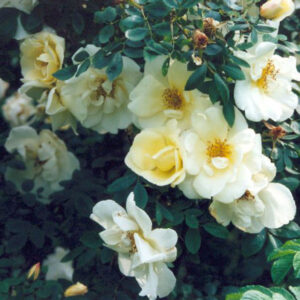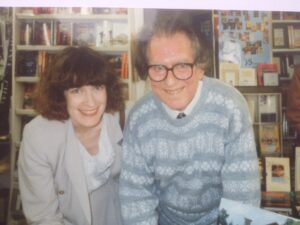 As I have written in Frost before, my formative years were spent in and around the vibrant Anglo-Welsh poetry scene. Writers such as Tony Curtis, Dannie Abse and Gillian Clarke were taking over the mantle from the Dylan Thomas generation and my father Mercer Simpson was in the thick of it.
As I have written in Frost before, my formative years were spent in and around the vibrant Anglo-Welsh poetry scene. Writers such as Tony Curtis, Dannie Abse and Gillian Clarke were taking over the mantle from the Dylan Thomas generation and my father Mercer Simpson was in the thick of it.
First as an expert on the genre – he wrote the section on it in The Bloomsbury Guide to Literature – and a reviewer. Then as poet himself. Except he wasn’t Welsh by birth – he was English, although in the end he lived in Cardiff for the last 55 years of his life. His first – and last – collections were through Rockingham Press in East Anglia, but I think the one of which he was always most proud was Rain From a Clear Blue Sky which was published by Gomer with the help of Welsh Arts Council funding.
Having a poet as a father gives a unique insight into their lives. This is not to say all poetry is autobiographical – it’s certainly not – but my father was very clear that some of his were and there is a section in Rain From a Clear Blue Sky that deals with childhood memories. All this was easy to accept as my  father’s past, but when the present reared its head, it could be harder. Or simply incredibly beautiful, like these lines about a rose bush that stood in my parents’ garden.
father’s past, but when the present reared its head, it could be harder. Or simply incredibly beautiful, like these lines about a rose bush that stood in my parents’ garden.
Fruhlingsgold
shakes her
curling-papered head,
the wind’s
premature blow-drier
scattering news
of dispersed beauty,
the white petals
leaving the golden heart
on each stem…
But there were certainly times when the insights seemed far too close to home and I still find parts of his last two collections difficult. Not just because I helped him to correct the proofs of the last one when he was in a nursing home, dying. It wasn’t a bad time – apart from the obvious – we became even closer over those galleys – and we were able to discuss what was going to happen surprisingly easily.
 Six months before the Welsh Academy had put on an eightieth birthday reception for him in the Norwegian Church in Cardiff Bay. For him it was the pinnacle of his acceptance as an Anglo-Welsh poet and I will never forget how much it meant to him. I was more than proud to be at his side as we listened to Tony Curtis, Ruth Bidgood and others read from their own work and celebrate my father’s. And he read himself – of course he did – he had been a lecturer, had even taught public speaking, so he was a consummate performer.
Six months before the Welsh Academy had put on an eightieth birthday reception for him in the Norwegian Church in Cardiff Bay. For him it was the pinnacle of his acceptance as an Anglo-Welsh poet and I will never forget how much it meant to him. I was more than proud to be at his side as we listened to Tony Curtis, Ruth Bidgood and others read from their own work and celebrate my father’s. And he read himself – of course he did – he had been a lecturer, had even taught public speaking, so he was a consummate performer.
There was a humour in his work, even in the most serious of subjects, particularly in Honest to God, a poem he read that night and I read at his funeral. And pathos too. As the child of a poet, there are times you get to look inside your parent’s soul.
Dear God
I hope I’ve got your correct address:
with so much mail going astray these days I wouldn’t want this letter
to get lost in the post.
I hope you don’t mind me leaving the writing of it rather late
but I felt I had to thank you for letting me stay in your house for so long.
I know I haven’t been the easiest of guests,
stealing your son’s bread and helping myself to his wine…
…Now that my time is nearly over
I insist on having the last word which must be gratitude:
gratitude for the miracle of your world that I, who might have died at birth,
was spared to live in…
…So please forgive me if I seem impertinent
in asking if I may come back and visit you again some time?
